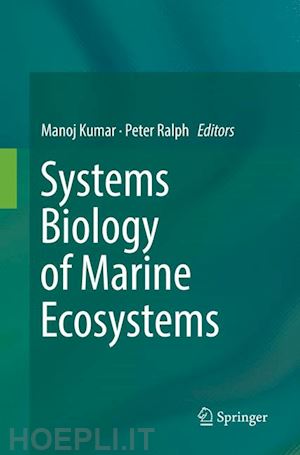
Questo prodotto usufruisce delle SPEDIZIONI GRATIS
selezionando l'opzione Corriere Veloce in fase di ordine.
Pagabile anche con Carta della cultura giovani e del merito, 18App Bonus Cultura e Carta del Docente
01. Macroalgal Functional Genomics: A missing area.- 02. Tolerance pathways to desiccation stress in seaweeds.- 03. Marine metal pollution and effects on seaweed species.- 04. Seaweed lipidomics in the era of 'omics' biology- A contemporary perspective.- 05. Volatiles in the aquatic marine ecosystem: ethylene and related plant hormones and sporulation in red seaweeds.- 06. Abiotic stress of seagrasses: Recent advances in transcriptomics, genomics and systems biology.- 07. Photobiology of seagrasses: a systems biology perspective.- 08. Systems Biology and the Seagrass Paradox: Adaptation, Acclimation and Survival of Marine Angiosperms in a Changing Ocean Climate.- 09. Gas and liquid chromatography mass spectrometry based metabolic profiling of marine angiosperm Zostera muelleri (Alismatales, Zosteraceae).- 10. Marine microalgae: systems biology from 'omics.- 11. Application of 'omic approaches to microbial oceanography.- 12. Effects of Ocean Acidification and UVRadiation on Marine Photosynthetic Carbon Fixation 13. Oxidative stress induced bioprospecting of microalgae.- 14. Bioactive small molecules mediate microalgal-bacterial interactions.- 15. Exploring the complexity of macroalgal-bacterial interactions through interkingdom signalling system.- 16. Role of bacteria in coral ecosystems.
Dr. Manoj Kumar is a research scientist (ARC-DECRA Fellow) in the Climate Change Cluster (C3), University of Technology Sydney (UTS), Australia. He obtained a PhD in Marine Biotechnology at the Central Salt and Marine Chemicals Research Institute (CSMCRI-CSIR), Gujarat, India. His major research activities have been focused on the eco-physiology and stress tolerance mechanisms of benthic marine macrophytes (seaweeds and seagrasses) to diverse environmental and anthropogenic perturbations under the scenario of global climate change through omics approaches (proteomics and metabolomics). His research interests have also included: the use of seaweeds in food and fuel; quality seed stock generation of seaweeds using tissue culture; and protoplast isolation techniques. He has also researched the epigenetic regulation of marine and terrestrial plants under environmental stress conditions. Dr. Kumar was a visiting scientist at the Agriculture Research Organization (ARO), Volcani Centre, Israel where he expanded his research activities in the area of phyto-hormone signaling that regulates root and shoot architecture in the Arabidopsis model plant. Currently, he is studying the early signals of seagrass loss using advanced ‘omics’ approaches, in order to understand eutrophication and light attenuation related phenotypic responses in seagrasses.
Prof. Peter Ralph is the Executive Director of the Climate Change Cluster (C3) at the University of Technology Sydney. He leads a dynamic, multidisciplinary group of researchers dedicated to improving our predictions about the impacts of climate change. Over the past eight years, he has grown this research institute to support over 100 staff and students. He is a member of the Blue Carbon International Scientific Working Group, formed under the auspices of the International Union for the Conservation of Nature, United Nations Environmental Program and the Intergovernmental Oceanographic Commission. He is the former leader of the CSIRO Marine and Coastal Carbon Biogeochemistry Cluster, which brought together the expertise of eight Australian universities in Australia's largest coastal blue carbon accounting, mapping and measurement study. He has recently been appointed to the Scientific Advisory Board for CzechGlobe (Global Change Research Institute - Czech Academy of Science).











Il sito utilizza cookie ed altri strumenti di tracciamento che raccolgono informazioni dal dispositivo dell’utente. Oltre ai cookie tecnici ed analitici aggregati, strettamente necessari per il funzionamento di questo sito web, previo consenso dell’utente possono essere installati cookie di profilazione e marketing e cookie dei social media. Cliccando su “Accetto tutti i cookie” saranno attivate tutte le categorie di cookie. Per accettare solo deterninate categorie di cookie, cliccare invece su “Impostazioni cookie”. Chiudendo il banner o continuando a navigare saranno installati solo cookie tecnici. Per maggiori dettagli, consultare la Cookie Policy.